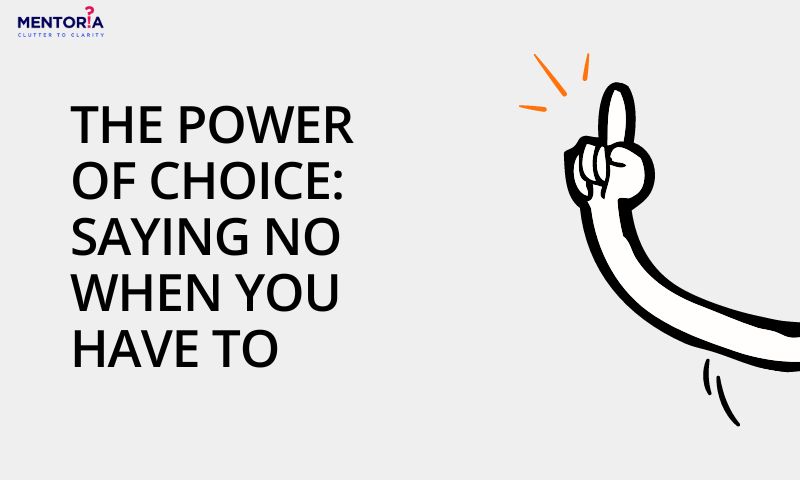The Power of Choice: Saying NO When You Have To

Saying no is an important skill that can help you set boundaries, prioritise your needs, and avoid stress and burnout. However, many people find it hard to say no because they fear disappointing others, losing opportunities, or being seen as rude or selfish. There is an important lesson that all of us have to learn. The lesson is simple: embracing the ability to decline is perfectly fine. Rather than spreading yourself thin, dedicating energy to a few projects you deeply care about proves more effective. Prioritising quality over quantity is key.
Turning down opportunities and establishing personal boundaries can pose a challenge, especially under pressure to always agree. However, rejecting an opportunity won’t define your success. “No” stands alone as a complete sentence.
In my experience, I used to be a ‘Yes’ person through and through. If you needed a hand, a leader, or someone to dive headfirst into a project, I was your go-to. Saying “Yes” felt like the golden ticket to growth, a surefire way to build an impressive portfolio. But you know what? It wasn’t always the best move.
There came a point when I was juggling so much that I was practically juggling my sanity, too. It hit me that while saying “Yes” opened doors, it also created a tangled web of commitments that left me spread way too thin. I thought turning down opportunities would slam those doors shut forever, holding me back from future chances. But you know what I realised? That wasn’t the case at all. Learning to decline gracefully became a game-changer. Saying “Not at this time” without feeling the need to justify or explain every detail? It’s liberating. I discovered that it’s okay to acknowledge my limits and politely decline, all while leaving the door open for potential collaborations down the road. Turns out, the fear of missing out wasn’t as big a deal as I once thought.
How Selectivity Can Be Useful
Being selective isn’t just about saying “no” more often; it’s like having a secret superpower that boosts productivity, slashes stress levels, and amps up your overall happiness. To nail this selectivity thing across all areas of life, it’s like having a carefully curated toolbox filled with essential strategies. First off, it’s all about knowing what makes your heart tick, what matters most to you. Think of it like your personal compass guiding every decision. Once you’ve got that in place, drawing clear lines becomes a piece of cake. Boundaries give you the power to gracefully bow out of things that don’t quite match up with your priorities.
But hey, it’s not all work and no play. Prioritising self-care is like filling up your own cup before pouring into others’. It’s about feeling rejuvenated and ready to take on the world. And here’s a tip: don’t be afraid to pass on tasks that someone else can handle just as well. Delegation? It’s a game-changer. Ever heard of the 80/20 rule? It’s like a magic wand that helps you figure out what’s truly worth your time and what’s just taking up space. Then there’s the art of reassessing commitments and being okay with letting some go. Trust me, it’s like a breath of fresh air once you embrace it.
The Pareto Principle, encapsulated by the 80/20 rule, highlights that a significant portion of outcomes stem from a minority of efforts. Identifying high-impact tasks and focusing on them while minimising less productive activities is key. Regularly reviewing commitments and adjusting as necessary helps maintain alignment. Letting go is essential to release attachments to activities or commitments that no longer serve your purpose, allowing space for fresh opportunities and growth. In the professional realm, selectivity is especially beneficial, enabling pursuit of meaningful work, achieving a balanced life, nurturing career growth, and fostering robust networks. Opting for projects that resonate with your passions, balancing work and personal life, focusing on skill enhancement and career advancement opportunities, and cultivating authentic connections contribute to a more fulfilling and purpose-driven career.
Discerning Opportunities
Discerning opportunities isn’t just about seizing the moment—it’s about making strategic choices that truly align with your aspirations and values. It’s like being a detective, investigating each opportunity that comes your way to see if it’s a perfect fit for your goals. Picture it as a puzzle; you’ve got your personal values and long-term dreams forming the edges, and each opportunity is a piece. Your job? Finding the ones that fit snugly into your puzzle, complementing your overall vision. Understanding one’s capabilities and limitations is equally crucial. Discernment involves assessing whether an opportunity aligns with existing commitments, skill sets, and resources. It necessitates a realistic evaluation of the time, effort, and potential outcomes associated with pursuing a particular path.
Let’s talk about having that eagle-eye discernment—it’s like having a superpower that helps you see through the glitz and glam to what really matters in the long run. Imagine this, you’re at crossroads, and there’s this shiny, tempting opportunity right in front of you. But hold on a sec. Is it just a quick win, or does it align with where you’re headed in the big picture? That’s the crux of discernment—figuring out if an opportunity fits snugly into your grand plan or if it’s just a flashy detour. But here’s the cool part: it’s not all about the destination. Sometimes, it’s the journey that counts. So, peek into that opportunity’s suitcase. Is there a chance to learn, grow, and level up your skills? Those experiences can be pure gold in the long haul.
Now, let’s talk about risk—every opportunity has its set of dicey bits. It’s like a balance scale: weighing what you might gain against what you could lose. That’s where the magic happens. It’s a thoughtful process that involves aligning what you value, understanding your limits, sizing up the potential long-term wins, embracing growth opportunities, and, of course, doing a little risk assessment dance. When you’ve got this discernment thing down pat, it’s like holding a map that leads straight to opportunities tailor-made for your personal and professional growth.
Essence Of Saying No
The significance of saying “no” lies in its profound impact on our brain functioning. Embracing “no” shifts our mental processes, empowering us to make self-aligned decisions. This shift greatly influences our mental well-being by fostering self-worth and enabling self-prioritisation. Moreover, it unveils unforeseen opportunities that “yes” might have obscured.
This practise helps establish crucial boundaries, pivotal in mental health treatment. By mastering the art of refusal, we cultivate essential boundary-setting skills. However, discerning when to say “no” amidst situations where “yes” seems preferable poses a challenge. Asking pertinent questions aids in decision-making: Will saying “yes” divert attention from more crucial matters? Might it lead to exhaustion or burnout? Adopting strategies can enhance our ability to decline effectively. Rehearsing responses, honesty, suggesting alternatives, and taking time for thoughtful consideration are invaluable techniques.
Setting boundaries for mental health is like putting on armour—it shields you from stress and helps you face challenges like a pro. And hey, saying “No”? It’s not about slamming doors shut; it’s about choosing the ones that lead you where you want to go. Picture it as your trusty compass, guiding you through life’s twists and turns straight toward your goals.
You know, saying “No” is more than just a word. It’s a bold statement that shouts, “Hey, I value myself!” It’s like holding up a sign saying, “My time and energy are precious, and I’m investing them wisely.” It’s a bit like a sculptor with a chisel—saying “No” chips away what’s unnecessary, revealing the masterpiece that’s you. It’s shedding that overcommitment weight, making room for pure excellence in the things that truly matter. But let’s be real, saying “No” isn’t a walk in the park. It’s like dancing between seizing opportunities and focusing on what truly lights your fire. Yet, once you’ve got this art down, it’s like crafting a life that’s a perfect match for your values and passions.
Strategic Focus
Strategic focus is akin to wielding a laser beam in a world bustling with distractions. It encapsulates the art of directing one’s energy and attention purposefully toward the endeavours that yield the most significant impact. At its core, strategic focus revolves around the principle of the 80/20 rule—identifying the vital few from the trivial many. It’s about pinpointing the select activities or tasks that generate a disproportionate amount of desired outcomes. By honing in on these high-yield areas, individuals can optimise their efforts and amplify their effectiveness.
Crafting a strategic approach isn’t just about making choices—it’s about making the right choices. Imagine it like creating a Venn diagram where your talents, passions, and objectives all intersect. When these elements align, bam! You’ve got a recipe for serious productivity and making a real difference. But here’s the catch, it’s not about being busy for the sake of it. It’s about diving deep, not spreading yourself thin. Focusing your energy on a few key things instead of juggling a million tasks? That’s where the magic happens. By concentrating your efforts, you get to level up your skills, become a true expert, and deliver top-notch results.
And hey, priorities change faster than Instagram trends. That’s why it’s crucial to keep checking in on your goals. What mattered yesterday might not cut it today. So, you gotta recalibrate your focus regularly to stay on track. Now, let’s talk about the power of “No.” It’s like having a shield to protect your focus. Turning down opportunities that don’t line up with your big picture ensures you’re putting your energy into the stuff that really counts.
In a nutshell, strategic focus is all about picking where to channel your attention, time, and effort. It’s about being selective, diving deep into what matters, and making a real impact. When you’ve mastered this skill, it’s like having a compass guiding you straight to your biggest dreams, both in your personal life and your career.
Overcoming Challenges
Navigating the terrain of saying “no” and honing in on strategic focus isn’t a smooth sail; it’s an intricate dance with challenges and hurdles that require deftness and perseverance. One of the primary hurdles lies in societal expectations. The culture of constant busyness often glorifies saying “yes” to every opportunity, creating an implicit pressure to always be in motion. Overcoming this challenge involves shifting this paradigm, understanding that quality surpasses quantity, and that strategic focus necessitates selective commitment.
Another hurdle is the fear of missing out. There’s a persistent worry that declining an opportunity might close doors or hinder growth. Overcoming this fear involves redefining success, understanding that saying “no” isn’t a setback but a strategic move toward aligning with authentic aspirations. Moreover, the internal struggle to balance obligations and personal aspirations poses a challenge. It’s easy to get caught in a web of commitments, leading to overextension. Overcoming this challenge entails setting clear priorities, understanding personal limits, and being willing to say “no” to safeguard one’s well-being. The discomfort of disappointing others often surfaces when declining opportunities. Overcoming this involves recognising that saying “no” is an act of self-preservation, not a rejection of others. Communicating respectfully and transparently can alleviate this discomfort.
Adopting strategies is key to surmounting these challenges. Cultivating a resilient mindset that values quality over quantity helps combat societal pressures. Embracing the notion that saying “no” is a strategic move toward personal growth and fulfilment reframes the fear of missing out. Establishing a support system or seeking guidance aids in navigating internal conflicts, ensuring alignment between commitments and personal aspirations. Moreover, practising assertiveness and effective communication techniques eases the discomfort of disappointing others when declining opportunities.
Overcoming these challenges involves a mindful recalibration of priorities, a shift in perspectives, and the cultivation of assertiveness and resilience. It’s a transformative journey toward intentional living, where strategic focus and saying “no” become tools for fostering personal growth, success, and well-being.
Opening The Right Doors
Opening the right doors is more than just turning knobs; it’s about discernment, intuition, and strategic choices that lead to transformative opportunities. Imagine standing before a corridor with multiple doors, each representing an opportunity. It’s not about opening every door; it’s about selecting those that align with your aspirations, values, and long-term vision. These doors hold the potential to shape your journey, and choosing the right ones can be pivotal.
Starting with self-awareness is like turning on the GPS for life—it helps you pinpoint the doors that match your goals and passions. It’s like having a special key that unlocks paths aligned with who you truly are. Making choices? That’s like holding the remote control to what we see in the world. Our choices shape what we notice. Farmers see crops, geologists spot fossils, and artists are all about those vibrant colours. Same view, different perspectives, right?
Now, here’s the kicker: there’s a difference between a “good choice” and the “right choice.” A “good choice” does the job, no moral fuzz. But a “right choice” lines up with your principles and keeps your heart happy. Balancing between the two? That’s the sweet spot. Personal integrity and inner wisdom? They’re like our decision-making sidekicks. They not only shape our character but also steer our life’s course. The heart and mind team up to guide us, even when the options seem limited. And hey, saying “No”? It’s not about slamming doors shut; it’s about handpicking the ones that match your vibe. It’s a conscious decision to carve out a life that’s authentic and true to you. By turning down certain paths, you’re actually opening doors to opportunities that really sync with your goals. Mastering the art of saying “No” is like having a magical compass in this maze of life. It’s about making choices that light up your priorities, fuel your passions, and guide you toward a more meaningful and fulfilling journey.
Choosing The Right Opportunities With Mentoria
For people wanting to choose the right career path, it is a daunting journey, since they will not be aware of the multitudes of opportunities and if what they will ultimately choose will be the right one for them. Saying no to careers that may seem promising but doesn’t align with their own value systems is of utmost importance. Experienced career counsellors at Mentoria can guide students through the results of psychometric assessments, helping interpret strengths and interests in relation to various career options. They provide personalised insights, helping students narrow down choices and explore potential career paths that fit their unique profile. Mentoria’s career guidance plan combines the insights from psychometric assessment, career counselling, and mentorship to create a personalised roadmap for their career journey. This plan outlines potential career paths, recommended courses, and strategies for achieving career goals.









